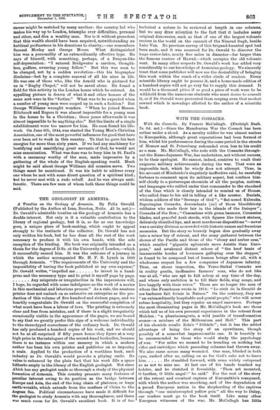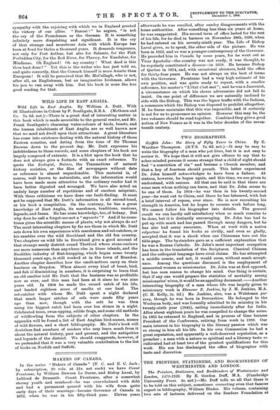WITH THE COSSACKS.
With the Cossacks. By Francis McCullagh. (Eveleigh Nash. Is. 6d. net.)—Since the Manchurian War the Cossack has been rather under a cloud. As a cavalry soldier he was almost useless to Kuropatkin, although great expectations had been formed of him, whilst his performances during the same period in the streets of Moscow and St. Petersburg redounded even less to his credit as a man. Mr. McCullagh, who rode with the Cossacks through- out the Russo-Japanese War, has undertaken, not without success, to be their apologist. He cannot, indeed, contrive to exalt their exiguous military achievements during the war. That were all impossible task, which he wisely does not attempt. Thus, in his account of Mischenko's singularly ineffective raid, he carefully forbears to comment upon its military aspect, but confines him- self chiefly to a picturesque chronicle of all the peoples, nations, and languages who rallied under that commander to the standard of the Czar which is clearly intended to remind us of Homer, who called Juno to his aid in telling of a like muster. Burials, whilom soldiers of the "Scourge of God " ; "flat-nosed Kalmuks, Zaporingian Cossacks, descendants [sic] of those bloodthirsty celibates who made their lair in the islands of the Dnieper " ; Cossacks of the Don ; "Caucasians with green banners, Circassian blades, and graceful Arab steeds, with figures like Greek statues, delicately chiselled lips, and most murderous dispositions "—never was a cavalry division so crowded with historic names and ferocious memories. But the story so bravely begun dies gradually away into a minor key of retreat, and the army gathered between the shores of the Pacific) and those of the "ebony and amber seas," which recalled "gigantic upheavals more Asiatic: than Euro- pean," and awakened distant echoes of "the hoof beats of innumerable hordes of horsemen galloping over the steppes," is found to be composed but of human beings after all, with wholesome respect for a few companies of Japanese infantry. Thus, on closer inspection, the Trans-Baikal Cossacks are in reality gentle, inoffensive farmers' sons, who do not like war at all, "who are apt to fall asleep at any time of the day, and whose only ambition is to till their fields, sing songs, and live happily with their wives." These are no longer the men of whom the Frenchman wrote in 1814: "La reoit de la Mr:mite de ces harborer; fait fremir la Nature." On tho contrary, they are "an extraordinarily hospitable and genial people," who will never refuse hospitality, lest they repulse an angel unawares. Perhaps the most illuminating pages in Mr. McCullagh's book are those which tell us of his own personal experiences in the retreat front Mukden : "a phantasmagoria, a wild jumble of transformation scenes—a mixture of the Millennium and Hell." This part of his chonicle recalls Zola's " Debacle" ; but it has the added advantage of being the story of an eyewitness, though possibly of a somewhat impressionable one. It is heartily to be recommended to those who would study the psychology of war. "For miles we seemed to be treading on nothing but rifles and cartridges which preceding columns had thrown away. We also came across many wounded. One man, blinded in both eyes, rushed after us, calling on us for God's sake not to leave
him He stumbled forward, with arms widely outspread so as not to miss me. At last one of his hands touched my
holster, and he clutched it feverishly. 'Thou art mounted, 0 brother, 0 little angel ! ' he said." For the rest of the story of the retreat and eventual capture of Kumpatkin's rearguard, with which the author was marching, and of the degradation of a proud European nation in the shepherding of the captives through "one uninterrupted yellow grin" all the way to Dalny, our readers must go to the book itself. Like many other European witnesses of the war, Mr. McCullagh has little sympathy with the rejoicing with which we in England greeted the victory of our allies. " Banzai " he argues, " is not the cry of the Frenchman or the German. It is something infinitely more disquieting and significant. It is the cry of that strange and monstrous Asia with which Europe has been at feud for thrice a thousand years. It demands vengeance, not only for Port Arthur, but also for Salamis, for the Pink Forbidden City, for the Red River, for Plessey, for Kandahar, for Mindanao. Oh England! Oh my country ! What deed is this thou hest done ? " Yet this is the writer who has just told us, and quite correctly, that the Cossack himself is more Asiatic than European ! It will be perceived that Mr. McCullagh, who is not, after all, an Englishman, but an imaginative Irishman. allows his pen to run away with him. But his book is none the less good reading for that.































































 Previous page
Previous page